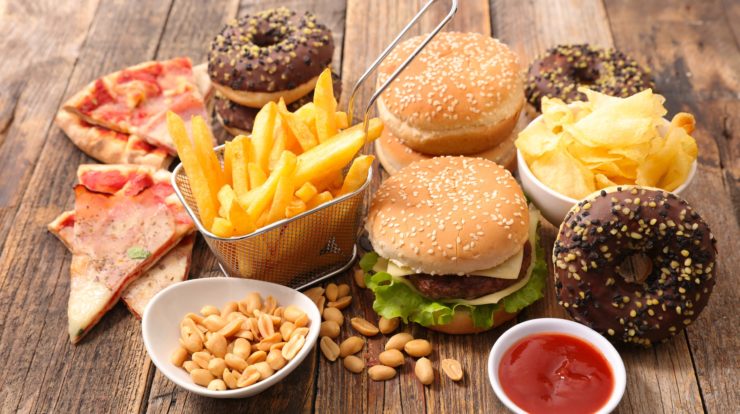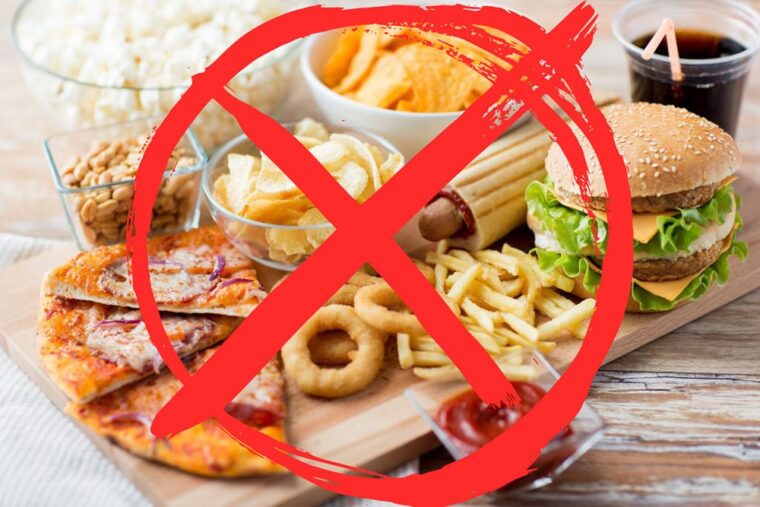A healthy diet is crucial for maintaining good health, preventing chronic diseases, and reducing the risk of cancer. Research has shown that the foods we eat can have a significant impact on our overall health and well-being. In particular, certain foods have been identified as being particularly harmful when consumed regularly, increasing the risk of cancer.
In this blog post, we will discuss five cancer-causing foods that you should avoid eating regularly. We will explain why these foods are harmful, provide examples of them, and suggest healthier alternatives to help you maintain a balanced and healthy diet. By avoiding these foods and making better food choices, you can significantly reduce your risk of developing cancer and improve your overall health and well-being.
In the following sections, we will explore each of these cancer-causing foods in detail, so you can gain a better understanding of how they affect your body and why you should avoid them.

1. Processed Meats
Processed meats are a popular food item that has been linked to an increased risk of cancer. Processed meats include any meat that has been preserved by smoking, curing, salting or the addition of chemical preservatives. These types of meats are often found in fast foods, deli meats, hot dogs, sausages, and bacon.
The process of making processed meats involves adding chemicals such as nitrates and nitrites, which can lead to the formation of carcinogenic compounds such as nitrosamines. These compounds can damage DNA and increase the risk of cancer, especially colorectal cancer.
To avoid processed meats, it’s important to read food labels carefully and avoid products that contain sodium nitrite, sodium erythorbate, or any other preservatives. Some alternatives to processed meats include fresh poultry, fish, lean beef, and plant-based protein sources like tofu, lentils, and beans. These can be cooked using healthier methods like grilling, roasting, or broiling to reduce the risk of carcinogens forming.
Examples of processed meats to avoid include hot dogs, bacon, deli meats, sausages, and canned meats. Instead, opt for fresh alternatives like grilled chicken, roasted turkey breast, or fresh fish as these options are healthier and less likely to cause cancer. By making these simple changes, you can help reduce your risk of cancer while still enjoying a variety of delicious and healthy meals.
2. Refined sugar
Refined sugar is a type of sugar that has been processed and stripped of its natural nutrients, including fiber, vitamins, and minerals. This makes it a source of empty calories that can contribute to numerous health problems, including cancer. Here’s how refined sugar affects the body:
- Raises blood sugar levels: Refined sugar is quickly absorbed by the body, causing a rapid rise in blood sugar levels. This can lead to insulin resistance, a condition in which the body is unable to use insulin effectively and is associated with an increased risk of cancer.
- Promotes inflammation: High consumption of refined sugar has been linked to chronic inflammation, which is believed to play a role in the development of cancer.
- Contributes to obesity: Refined sugar is a significant source of empty calories, which can contribute to weight gain and obesity. Obesity is a risk factor for several types of cancer, including breast, colorectal, and endometrial cancer.
Examples of foods high in refined sugar include soda, candy, baked goods, and many processed foods. To reduce your intake of refined sugar, try these alternatives:
- Natural sweeteners: Use natural sweeteners such as honey, maple syrup, or stevia in moderation.
- Fresh fruit: Fresh fruit is a great source of natural sweetness and provides fiber and other nutrients.
- Whole grains: Choose whole grains such as brown rice, quinoa, or whole wheat bread instead of refined grains such as white bread or white rice.
By reducing your intake of refined sugar and choosing healthier alternatives, you can help reduce your risk of cancer and other chronic diseases.
3: Deep-fried foods
Deep-fried foods are popular for their crispy texture and delicious taste, but they are also one of the most harmful foods to consume regularly. When foods are deep-fried, they are submerged in hot oil, which causes them to absorb the oil and become high in calories and unhealthy fats. These unhealthy fats can cause inflammation in the body, which can increase the risk of developing cancer.
Examples of deep-fried foods include French fries, fried chicken, donuts, and onion rings. Other foods that are often deep-fried include fish, shrimp, and vegetables. These foods are often found in fast-food restaurants and are popular options for takeout and delivery.
Alternatives to deep-fried foods include baked or grilled options. Baking and grilling use less oil and are healthier cooking methods. Instead of deep-fried French fries, consider baking sweet potato fries or making roasted vegetables. Instead of fried chicken, try grilling or baking chicken breasts.
In addition, air fryers are becoming increasingly popular as a way to mimic the taste and texture of deep-fried foods using less oil. These kitchen appliances use hot air to cook food, resulting in crispy and delicious food without the harmful effects of deep-frying.
By reducing your consumption of deep-fried foods and opting for healthier alternatives, you can help lower your risk of developing cancer and improve your overall health.
4: Soda and sugary drinks
Sodas and sugary drinks are widely consumed by people of all ages, but they are a major contributor to the rising rates of cancer, obesity, and other chronic diseases. Here’s a closer look at how sugary drinks affect the body, along with some examples of sugary drinks and alternatives to consider.
Explanation of how sugary drinks affect the body: Sodas and sugary drinks are high in sugar, which is quickly absorbed into the bloodstream, leading to a spike in blood sugar levels. This spike triggers the release of insulin, which in turn can lead to weight gain and increase the risk of type 2 diabetes. Furthermore, the high sugar content in these drinks can damage teeth and increase the risk of tooth decay. Studies have also linked consumption of sugary drinks to an increased risk of certain cancers, such as colon, breast, and prostate cancers.
Examples of sugary drinks: Examples of sugary drinks include soft drinks, fruit juices, energy drinks, sports drinks, and sweetened teas. A single can of soda can contain up to 10 teaspoons of sugar, while fruit juices are often high in fructose, a type of sugar that can be harmful in excess. Energy drinks and sports drinks are often marketed as a way to boost energy and performance, but they are also high in sugar and caffeine.
Alternatives to soda and sugary drinks: Water is always the best choice when it comes to staying hydrated. Other alternatives to consider include unsweetened teas, sparkling water, and low-sugar beverages like coconut water, vegetable juice, and kombucha. You can also try adding fresh fruit, such as lemon or berries, to your water to add flavor without added sugar. When selecting fruit juices, look for those with no added sugars and consume them in moderation.
Avoiding sugary drinks is an important step in reducing the risk of cancer and other chronic diseases. Making healthier beverage choices can be a simple but effective way to improve your overall health and well-being.
5: Trans fats
Trans fats are a type of unsaturated fat that is commonly found in processed and packaged foods. They are created through a process called hydrogenation, which turns liquid oils into solid fats. Trans fats have been linked to a range of health problems, including heart disease, diabetes, and cancer.
Explanation of how trans fats are harmful:
Trans fats are harmful because they can raise levels of LDL (bad) cholesterol and lower levels of HDL (good) cholesterol. This can increase the risk of heart disease and stroke. Additionally, trans fats have been linked to an increased risk of several types of cancer, including breast, prostate, and colorectal cancer. One study found that women who ate high levels of trans fats had a 78% increased risk of breast cancer.
Examples of foods containing trans fats:
Trans fats are often found in processed and packaged foods, as well as in fast food and fried foods. Some examples of foods that may contain trans fats include:
- Margarine
- Shortening
- Fried foods (such as french fries and chicken nuggets)
- Baked goods (such as cookies and cakes)
- Snack foods (such as chips and crackers)
- Frozen dinners
Alternatives to trans fats:
The good news is that it is possible to avoid trans fats by choosing healthier alternatives. Here are some tips for avoiding trans fats in your diet:
- Choose foods that are labeled “trans fat-free” or “zero trans fats.”
- Avoid processed and packaged foods as much as possible.
- Use healthy oils for cooking, such as olive oil or coconut oil.
- Instead of margarine or shortening, use butter or a plant-based spread made from healthy oils.
- Bake your own treats at home using healthy ingredients, such as whole grain flour and natural sweeteners.
- Opt for fresh, whole foods whenever possible, such as fruits, vegetables, and lean proteins.
By making these simple changes to your diet, you can reduce your intake of trans fats and lower your risk of cancer and other health problems.
Conclusion:
It’s important to remember that the foods we eat play a significant role in our overall health, and can have a direct impact on our risk of developing cancer. By avoiding or limiting the consumption of certain foods, we can reduce our risk of developing this devastating disease.
In this post, we have highlighted five cancer-causing foods that should be avoided or consumed in moderation. These foods include processed meats, refined sugar, deep-fried foods, soda and sugary drinks, and trans fats.
To minimize your risk of cancer, it’s important to incorporate a variety of healthy foods into your diet, such as fresh fruits and vegetables, whole grains, lean protein, and healthy fats. A well-balanced diet that is low in processed and sugary foods can not only reduce your risk of cancer, but can also help maintain a healthy weight, boost your energy levels, and improve your overall health and well-being.
In conclusion, by making small changes to your diet and lifestyle, you can take important steps towards preventing cancer and maintaining optimal health. Remember, prevention is always better than cure, and a healthy diet is an important part of this.

